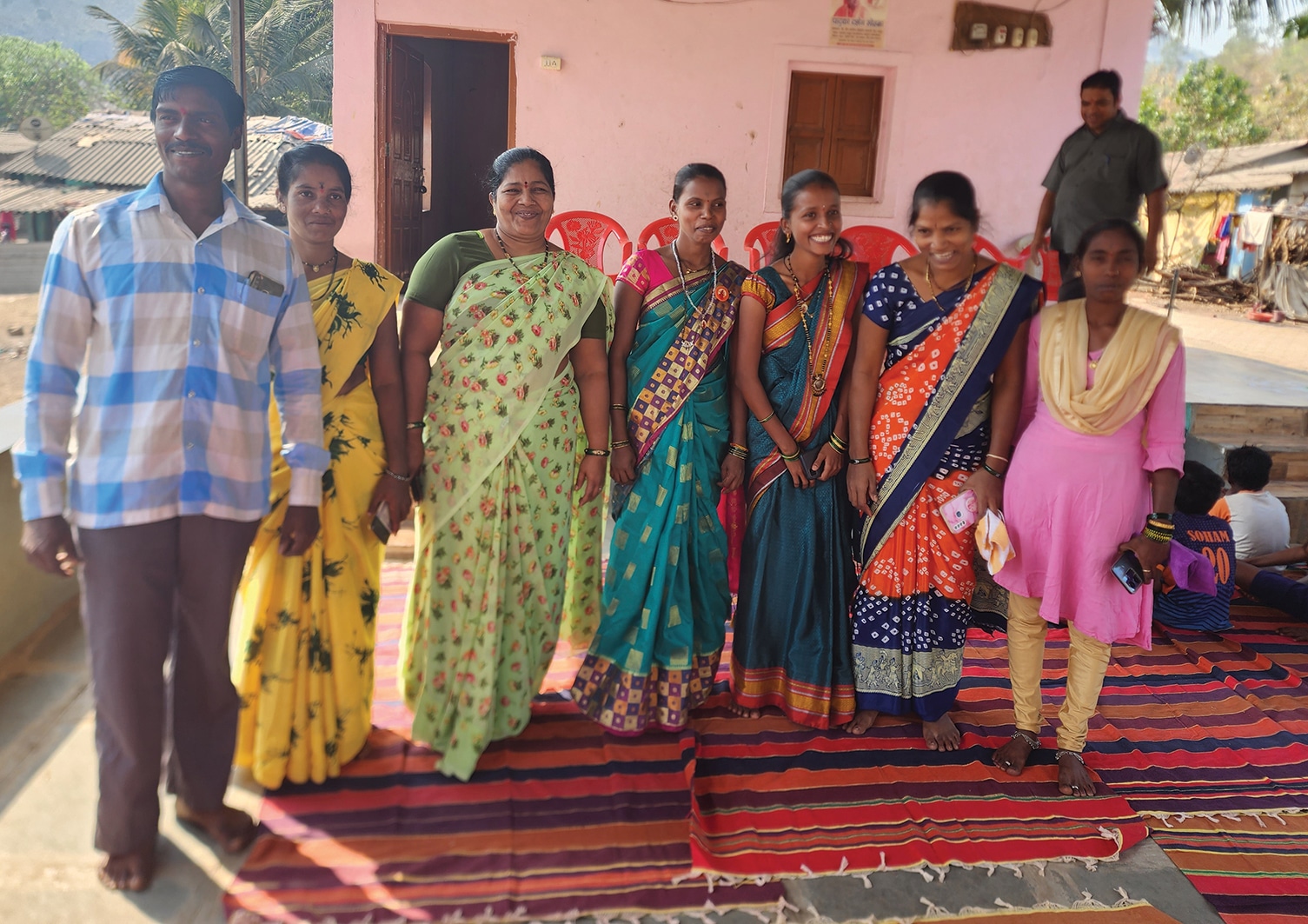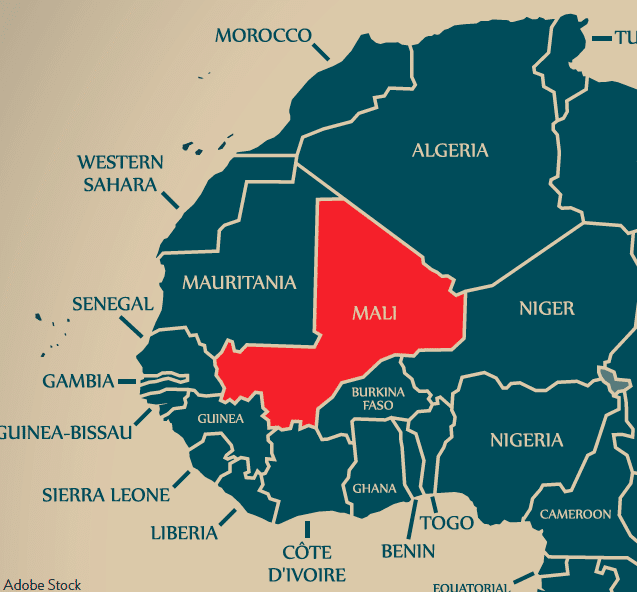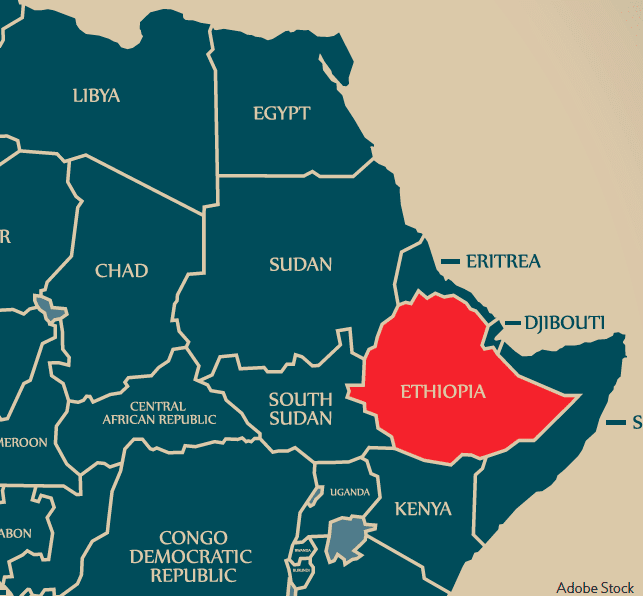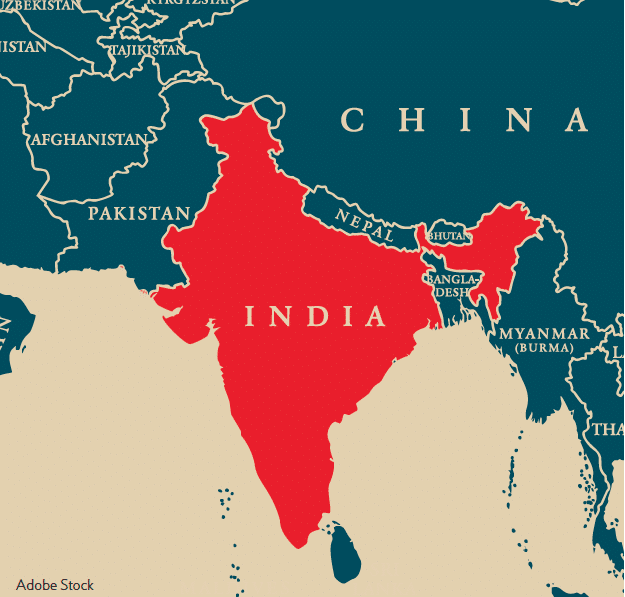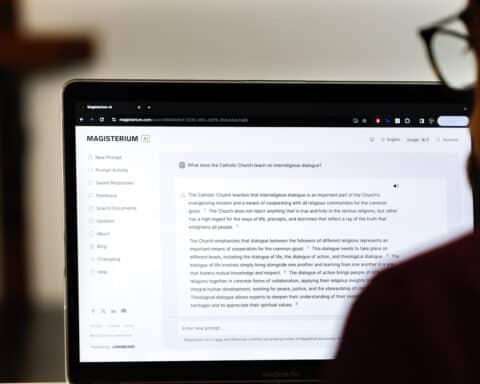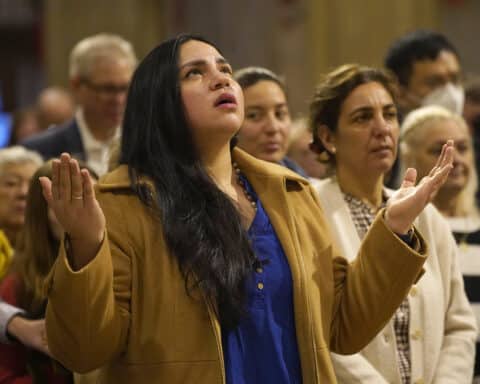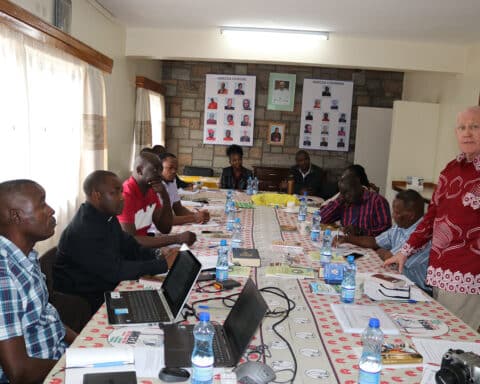This article was originally published in The Priest magazine, a publication of OSV.
World Mission Sunday will be celebrated Oct. 22. It is the one Sunday of the year when the Mass is celebrated exclusively for missionary activity. Donations collected at worldwide Masses this Sunday go, in their entirety, to support churches, hospitals, schools and vocations where the Church is new, young or poor. World Mission Sunday offers all Catholics the chance to show love and solidarity to our brothers and sisters who share our faith. And the Church joins missionaries everywhere to support them in spreading the Gospel.
To understand the work of the Church in mission, we explore three stories of mission activity from three places across the globe.
Father Rene Dakouo
A journey of faith and resilience in Mali
Rene Dakouo’s story begins in Treichville, Ivory Coast, where he was born March 7, 1985, to Francoise Dakoud and Francine Dakouo. From a young age, Dakouo felt a deep calling to the priesthood. Attending Mass with his parents, he would gaze upon the priests, observing the joy and fulfillment radiating from their prayers. Inspired by their devotion, Dakouo shared his dream with his parents, expressing his hope of one day becoming a priest with God’s guidance.
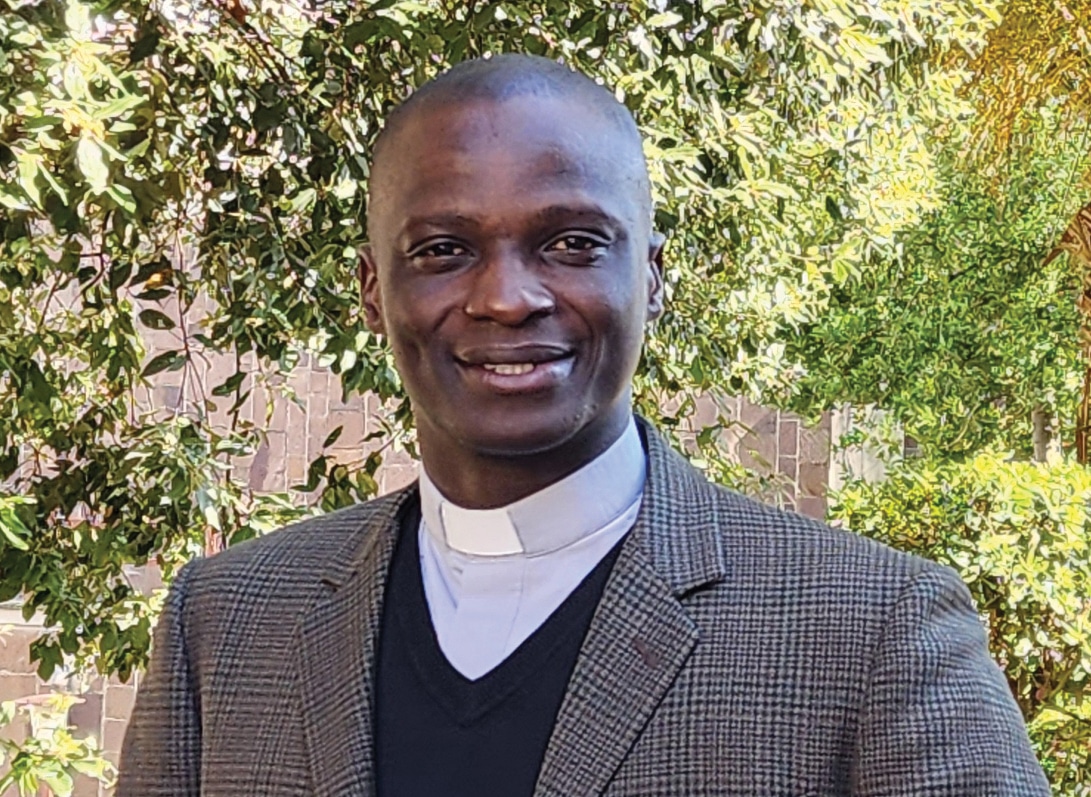
However, financial hardships struck the family when Dakouo’s father lost his job during his fifth-grade year. Unable to afford his education any longer, Dakouo accepted this challenge gracefully, understanding that he could contribute to his family’s well-being through various small jobs. Little did he know that a life-changing opportunity awaited him in the form of his aunt’s visit from Mali.
Witnessing the dire circumstances preventing Dakouo and his brother from attending school, Dakouo’s aunt made a courageous decision to bring them to Mali, recognizing the importance of education for their future. Upon their arrival, Dakouo found himself enrolled in a Catholic school under the guidance of his uncle, the headmaster. The doors to education swung open once again, illuminating Dakouo’s path forward.
“I saw God’s guiding hand in this. He never leaves us alone, but nothing in the Bible says he will make it easy for us either! We are called to follow him, and in my case he surrounded me with people who have inspired me throughout my life to do so.”
— Father Rene Dakouo
“I saw God’s guiding hand in this,” now Father Dakouo told The Priest. “He never leaves us alone, but nothing in the Bible says he will make it easy for us either! We are called to follow him, and in my case he surrounded me with people who have inspired me throughout my life to do so. But he also made me resilient, giving me daily opportunities to grow in my faith and love for him.”
During middle school, he joined a group of young men who, like him, were discerning their vocations. This experience led him to the minor seminary, where he spent three transformative years deepening his relationship with God. The clarity and conviction Dakouo gained during this period propelled him to continue his journey toward the priesthood.
Before entering major seminary, a then-young Dakouo spent a year assisting a parish priest, immersing himself in the day-to-day realities of priestly life. This provided him with what he described as “a profound understanding of the sacrifices and joys that accompany the vocation.”
“Filled with gratitude and a burning desire to serve, I wrote to my bishop, expressing my intention to become a parish priest and requesting to enter seminary,” Father Dakouo said. His dedication and unwavering faith were rewarded when he was accepted, ultimately leading to his ordination on July 10, 2010.
For Father Dakouo, the essence of his priestly calling lies in serving others, mirroring the example set by Jesus Christ himself. Reflecting on Luke 22:26, he draws inspiration from Christ’s words: “Let the greatest among you be as the youngest, and the leader as the servant.” This teaching, he said, “is my compass, or, well, I hope it is: We are called to selflessly serve God, and we are called to do so by serving every single person as if they were him.”
Studying in Rome
In 2021, after serving in five different parishes, including the cathedral in his diocese, Sicasso, and a 10-month stint as secretary to Bishop Jean Baptist Tiama, Father Dakouo was sent to Rome in July 2021 to study canon law at the Pontifical Urban University.
“There is great need for canonists in Mali,” he said, speaking in Italian. “There are only a handful of canon lawyers right now, distributed in the six dioceses in the country. But better understanding the law of the Church helps further understanding our faith, and as a mission territory, where the Church is still too young and our faith still taking root, I hope my time in Rome will become an asset to my brothers in the faith back home.”
But his time in Rome is not only about better understanding the law of the Church, but also its diversity. Studying at the Urban University, which has as its mission to train priests, religious brothers, and sisters and lay people who serve as missionaries or in missionary countries, has given Father Dakouo a firsthand experience of the universality of the Church.
| Work of the Holy Spirit |
|---|
|
“The Holy Spirit is indeed the principal agent of the whole of the Church’s mission. His action is preeminent in the mission ad gentes, as can clearly be seen in the early Church: in the conversion of Cornelius (cf. Acts 10), in the decisions made about emerging problems (cf. Acts 15) and in the choice of regions and peoples to be evangelized (cf. Acts 16:6ff). The Spirit worked through the apostles, but at the same time he was also at work in those who heard them: ‘Through his action the Good News takes shape in human minds and hearts and extends through history. In all of this it is the Holy Spirit who gives life.'” — Pope St. John Paul II, Redemptoris Missio, No. 21 |
“Being here, studying at the Urban University, surrounded by priests and sisters who, like me, come from missionary territories, is of great help for me,” he said. “Encountering priests and religious from Asia or Latin America, in addition to Africa, is of great help to better understanding the many graces and challenges of the universal Church.”
“Knowing the many realities of the Church, not only the one we face in my country, is a source of great wealth,” he said. “It serves as a reminder that we are not walking alone. We have Christ on our side. And we also have millions around the world who face similar circumstances — local churches that at one point or the other were lacking canon lawyers or theologians, liturgists and holy religious sisters.”
Rome, he said, has also served as a reminder that there are millions who, though living their ministries in very different ways, are also working for the kingdom of God, praying for their brothers and sisters in mission territories and generously sharing their talents. “Christ himself told us, ‘The harvest is plentiful, but the laborers are few. Therefore pray earnestly to the Lord of the harvest to send out laborers into his harvest,'” said Father Dakouo.
Prayers for peace
Once his time in Rome is complete, Father Dakouo will be going back to Mali to serve in his diocese, where priests are in high demand. He hails from a continent where the Catholic Church is growing rapidly — there were 10 million Catholics in Africa in the early 1900s, and there were 400 million Catholics in the early 2000s — but ministers in a country where those who follow Christ are a tiny minority.
Though Mali is a country where peace cannot be taken for granted after years of unrest, partially fueled by the presence of terrorist groups such as al-Qaida, the dividing line is not religion: “We [Catholics] have a good rapport with everyone, and this is particularly important as we see peace returning to Mali. Because acknowledging ourselves as brothers and sisters of all, regardless of our religion, goes a long way in securing long-lasting peace. We can join in the joy of our Muslim brothers when they celebrate their feasts, and they are also able to join in ours.”
Peace, Father Dakouo said without hesitation, is the first thing he prays for, urging others to follow suit. In addition, and deeply related, he acknowledges the challenges that exist within the Church: The lack of attention given to the youth, “who represent the future of our faith”; the crisis of vocations to the priesthood and religious life “that continues to grow everywhere, even in Africa, where we see countries with thousands in the seminaries, the numbers are decreasing, calling us to devise a comprehensive response”; and also a growing isolation. “How often do we find ourselves worrying only about what’s happening in our parish, in our backyards, instead of praying and supporting our neighbors?”
Asked about what he would tell priests in the United States ahead of World Mission Sunday, Father Dakouo was very direct: “Can you share from the pulpit the reality of the Church in mission territories? Can you raise awareness over the challenges we face in Mali, but also throughout Asia and Latin America? Can you be the spark that lights the fire, leading Catholics in America to pray for their brothers in the faith from faraway lands?”
Father Nenetsanet Burka
Faith and service in Ethiopia
Ethiopia, a country rich in religious diversity, has long been a land of spiritual significance, with Christianity first introduced in the country in the fourth century. Amid this cultural tapestry, Father Nenetsanet Burka, a dedicated Catholic priest, has emerged as a beacon of hope, serving his community with unwavering faith and compassion. From his humble beginnings as an altar boy to the present, when he’s the first priest of the Vicariate of Gambella to study in Rome, Father Burka’s journey exemplifies the power of vocation and the resilience of the human spirit.
Raised in the village of Addo, where Muslims, Catholics and Protestants coexist, Father Burka recalls the profound impact of witnessing the presence and dedication of white priests from an early age. One particular missionary, whom he only remembers as Father Peter, ignited the spark of faith within him. Father Burka remarks, “I thought that God, this loving creature whom we couldn’t see, must look like Father Peter did!”
“In my heart, I was convinced that being a priest was not something for a Black child like me: I had never left my village, and there was no Black priest in my area. Only Father Peter, the only white person I encountered when I was a child.”
— Father Nenetsanet Burka
He began serving as an altar boy at a young age, wearing the red cassock, “and I loved it,” he said. But more than the uniform of the altar servers, what caught his attention was “Father Peter, the faith he projected, and the visible joy he experienced when, for instance, celebrating the Mass. But in my heart, I was convinced that being a priest was not something for a Black child like me: I had never left my village, and there was no Black priest in my area. Only Father Peter, the only white person I encountered when I was a child.”
Yet during his teenage years, more priests began to arrive, all of them from Ethiopia. They first came as missionaries while they were in seminary, and eventually, they would come back after being ordained priests. I realized that my thoughts were wrong and that my heart was right in calling me to follow Father Peter into the priesthood.”
Encouraged by a seminarian who visited his village, Burka entered the seminary. Choosing to focus his ministry on evangelization, he found solace and purpose in the Camboni congregation.
| Wisdom of Pope Benedict XVI |
|---|
|
“We cannot keep to ourselves the love we celebrate in the Sacrament [of the Eucharist]. By its very nature, it asks to be communicated to everyone. What the world needs is the love of God, to encounter Christ and believe in him. For this reason the Eucharist is not only the source and summit of the life of the Church; it is also the source and summit of her mission: ‘An authentically Eucharistic Church is a missionary Church.'” — Pope Benedict XVI, Sacramentum Caritatis, No. 84 |
After completing his studies, Father Burka’s commitment to serving the marginalized led him to a parish 35 miles from the town of Gambella. This region, settled by internally displaced people who sought refuge from a devastating drought three decades ago, presented him with immense challenges. The impoverished community, relying on subsistence farming, struggled to make ends meet.
Despite these hardships, Father Burka remained steadfast in his dedication to his parishioners. He worked tirelessly to provide spiritual guidance and material support to those in need. In his own words, he shares, “They are very poor working people, whose work goes from hands to mouth.”
The Vicariate of Gambella became his home, and his unwavering commitment earned him the respect and love of the community.
Faith amid a diverse country
Recognizing Father Burka’s potential, his bishop offered him an opportunity to further his studies in Rome. Eager to expand his knowledge and deepen his understanding of the Faith, Father Burka embarked on a new chapter in his journey. The Society for the Propagation of the Faith generously provided support, enabling him to pursue this educational opportunity.
In Ethiopia, the Catholic Church represents a small minority among various religious groups. Orthodoxy and Islam dominate the religious landscape, while Catholics comprise a mere 0.7% of the population. Father Burka acknowledges the diverse tribal makeup of his country, which often leads to social unrest and challenges within his own parish. Serving a poverty-stricken community, divided even among different Catholic rites, further underscores the difficulties he faces.
The Society for the Propagation of the Faith supports the education of hundreds of priests such as Father Burka, and it relies on the generosity of Catholics from around the world to accomplish this. World Mission Sunday, celebrated in every parish on the second to last weekend of October, is the financial driving engine. This Ethiopian priest knows it, which is why, when this day comes, he preaches about the importance of being generous with Catholics in mission territories, despite the fact that he himself is in one of these 1,150 territories where the Church is too young or too poor to be self-reliant.
“The World Mission Sunday collection in my parish raised the equivalent to $25 during my last year there,” he said. “It might seem like nothing to a priest in the West, but it brought tears to my eyes: a community that has nothing gave what little they had to help spread the Gospel amongst those who have even less.”
Tragically, Ethiopia has experienced heightened suffering in recent years due to violence and social inequality. Father Burka’s people have faced severe hunger and turmoil. In the face of such adversity, his unwavering faith and commitment to serving others continue to inspire hope in his community.
His journey from a small Ethiopian village to Rome serves as a testament to the transformative power of faith and the resilience of the human spirit. Despite the challenges he has encountered along the way, his dedication to the Gospel and his tireless service to the marginalized remains unwavering. In a country where Catholics are a minority, Father Burka’s vocation shines as a beacon of hope, reminding us all of the transformative power of compassion and unwavering faith in the face of adversity.
Bringing hope and faith to India
Some 45 years ago, during his inauguration Mass, which coincided with World Mission Sunday, Pope St. John Paul II urged the world to “open wide the doors for Christ” and spread his saving power across all aspects of life. This message holds particular significance in missionary territories, where the Catholic Church faces challenges due to its youth, poverty or persecution.
One such place is India, a country with a population of 1.4 billion, where Catholics represent less than 1.6%. Despite struggles, the Indian Catholic community remains resilient, often paying the ultimate price for their faith.
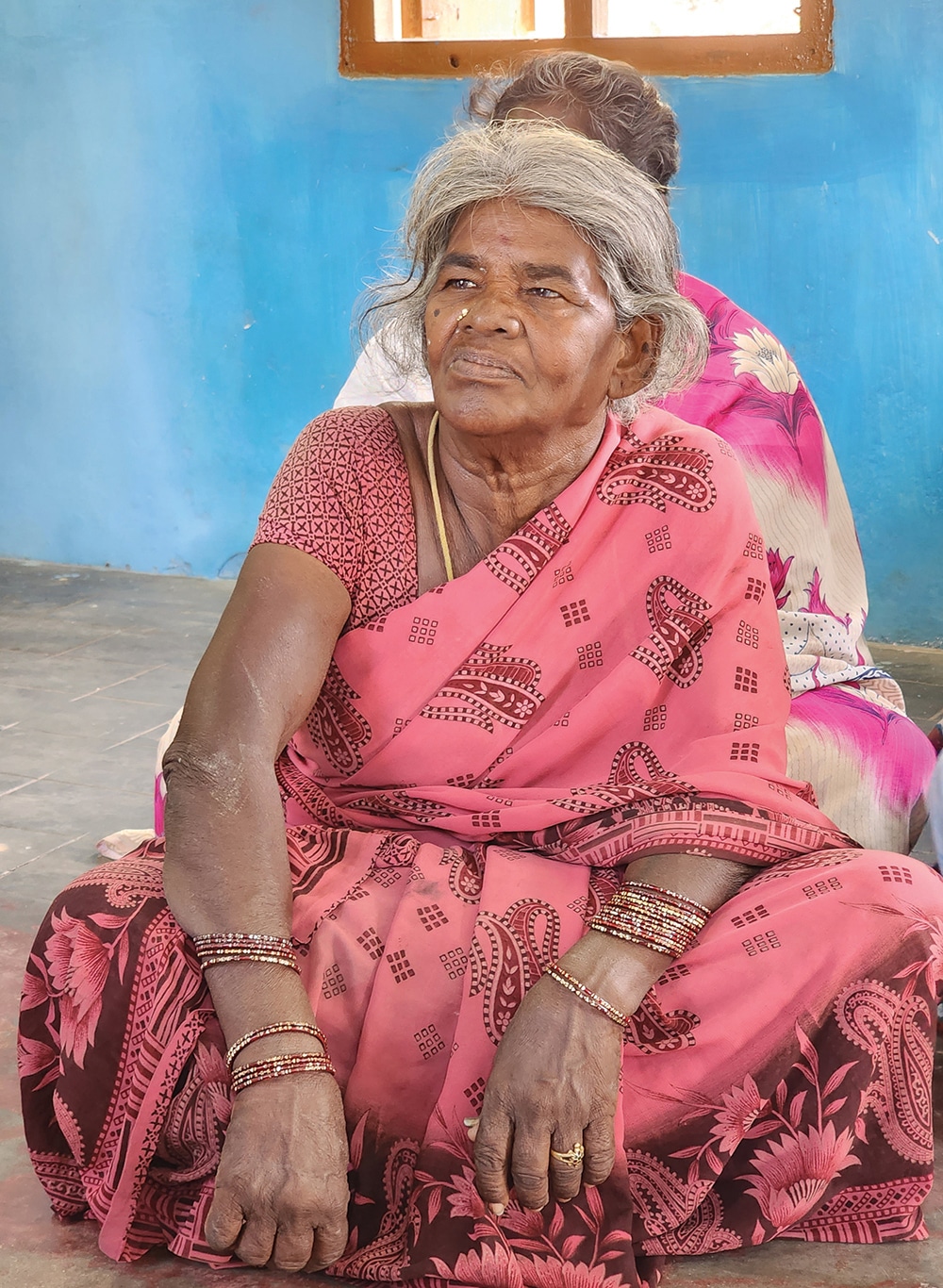
This August marked the 15th anniversary of the Kandhamal massacre, a tragic event in which radical Hindu mobs attacked the impoverished Christian minority in Odisha. During the riots, approximately 100 people were killed, thousands were injured and countless homes and churches were destroyed. The violence was carried out by mobs adorned with saffron headbands, a sign of right-wing Hindu militancy, and shouting slogans such as Jai shri ram! (“Victory to the Hindu god”). Attackers wielded rods, tridents, swords, firearms, kerosene and even acid. Christians who refused to deny Christ were buried alive, set ablaze or gutted in front of their children.
“The people here are economically very poor, but they have a faith that can move mountains.”
— Father John Peter
In many cases, the government refused to acknowledge the dead because the wind had carried the ashes away, and most of those killed were so poor that they had never even been registered as having been born.
To be sure, the 2008 pogrom was hardly an isolated incident. Violence against Christians throughout India continues routinely today, although on a smaller scale. In December, the U.S. Commission on International Religious Freedom expressed “outrage” that India had not been designated a “country of particular concern” by the U.S. State Department’s religious freedom report, claiming the omission was tantamount to “turning a blind eye … to particularly severe religious freedom violations.”
For example, Christians are passed over for government jobs. State laws make it virtually impossible to open new parishes in many regions. The Dalits — formerly known as untouchables in India’s caste system — lose the affirmative actions taken by the national government to make up for historical oppressions. The government’s justification for depriving Dalit Christians of their rights is that they have the support of Christians worldwide.
Faith that moves mountains
Yet despite the constant threat of physical violence faced by India’s Christian minority, according to Cardinal Oswald Gracias, archbishop in Mumbai, of the Archdiocese of Bombay, Catholics are a “vibrant community, seen not only in our attendance at Sunday Mass but also in the involvement in different activities.”
He emphasizes three priorities for the Church beyond evangelization: education, outreach to rural areas lacking basic amenities, empowering girls in a society where child marriage is still prevalent. The Church runs “self-help” groups that address unemployment and provide support to Indigenous villagers and Dalit populations. Dedicated animators, many of them women, work tirelessly to combat child marriage, addiction and health-related issues while promoting gender equality in a country where in rural areas girls are often married off when they reach puberty.
The local Church also recognizes the importance of fostering vocations, both priestly and religious, to ensure a vibrant future. The Society of St. Peter the Apostle, founded in 1889, supports mission vocations across Asia and Africa, providing financial assistance to approximately 28,000 major seminarians and men and women religious novices. The St. Pius X Archdiocesan Seminary of Bombay relies on this support to send seminarians to Rome for further education and training, essential for the formation of well-equipped priests.
In Tiruchirappalli, about 2,000 miles south of Mumbai, the St. Francis Xavier School for Boys provides practical training in eight different trades, ensuring a brighter future for its students. With support from The Pontifical Mission Societies USA, the school offers education in carpentry, mechanics, welding, bookbinding, machining and electrical work. There are 80 teens from across the region living in the school and 110 other students from the city of Trichy, all of them eager to learn. Students here are aware that the skills they are learning will allow them to make at least 1,000 rupees a day ($9), significantly more than what most of their parents make.
Founded in 1906 by the Salesians, the first missionaries to reach this region of India, the school today is run by the diocese and receives support from The Pontifical Mission Societies USA. This help is particularly channeled through the Missionary Childhood Association, which, through programs such as Mite Boxes, helps bring school-aged children in the United States closer to the realities of children in other parts of the world.
According to Father John Peter, the principal of the training center, “The people here are economically very poor, but they have a faith that can move mountains.”
Most of the student’s parents are agricultural day laborers. They work approximately 100 days per year with a guaranteed yearly income of $400 that comes from the government. With this, their families subsist on barely $1 per day. As carpenters, they would make twice as much, and they could work every day of the year.
The St. Francis Xavier School is run by Catholic priests and a dozen teachers, many of whom are engineers. The process is very hands-on for the students, who will have gained hundreds of hours of experience in the trade(s) they choose by the time they graduate from the three-year program.
The journey of the Church in India is a testament to the indomitable spirit of the faithful, who persevere in the face of persecution, poverty and prejudice. Their unwavering faith and dedication to the Gospel provide invaluable lessons about humility, compassion and the transformative power of love.
In a world filled with darkness and despair, the Church in India shines as a radiant example of hope and resilience. Let us heed their call, join their mission and together as one universal Church open wide the doors for Christ to enter every corner of the world.

